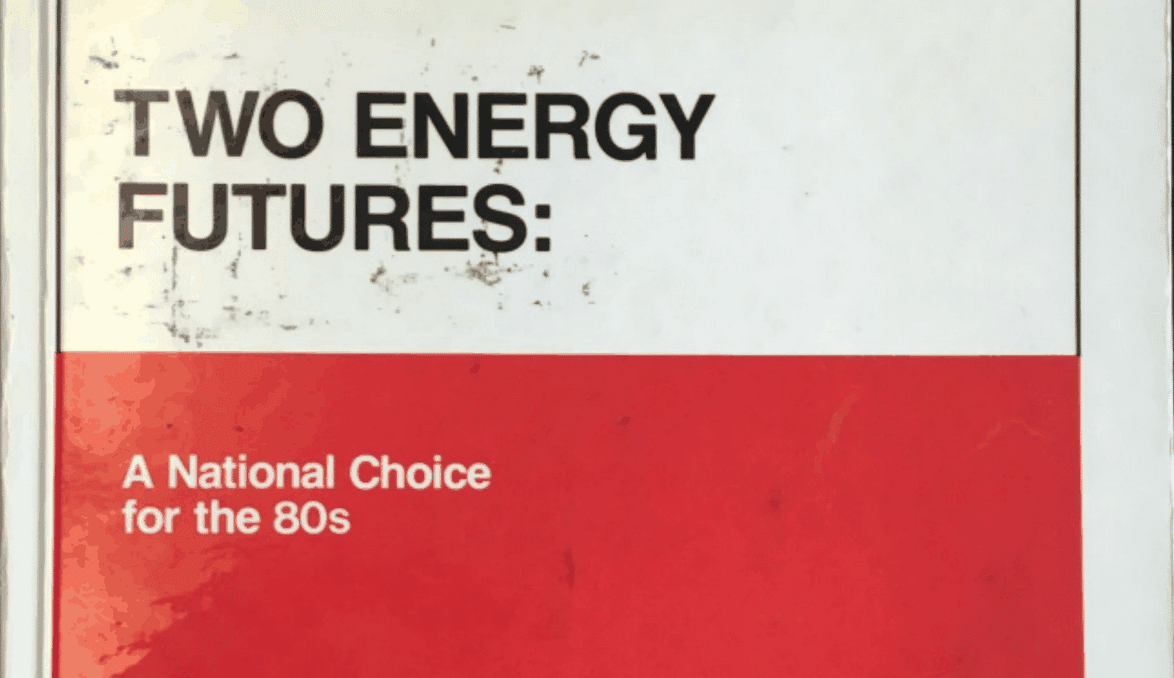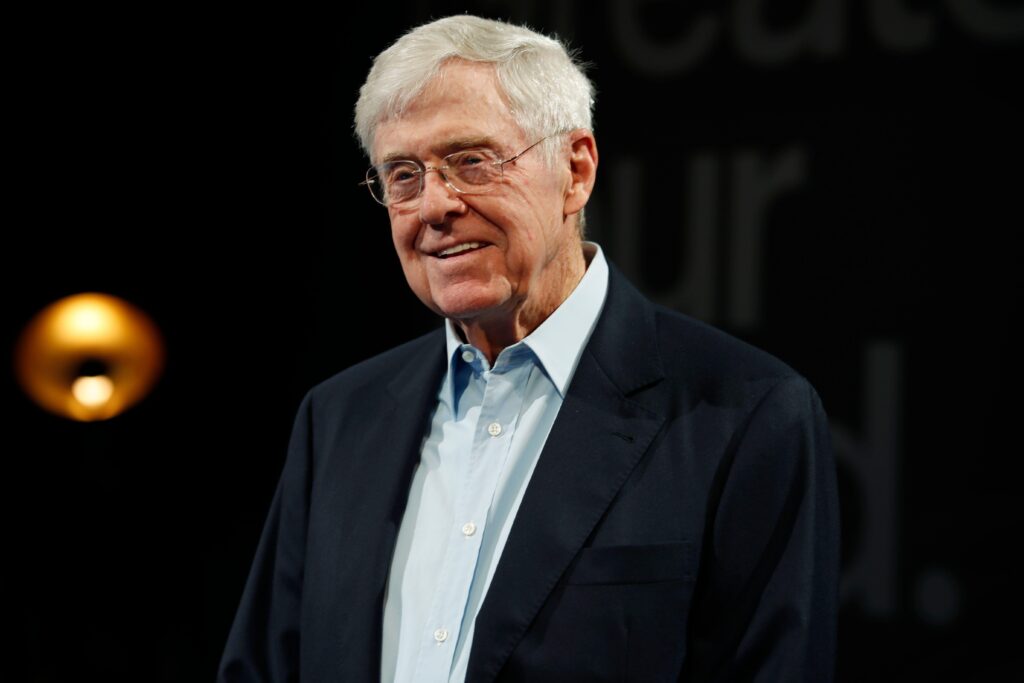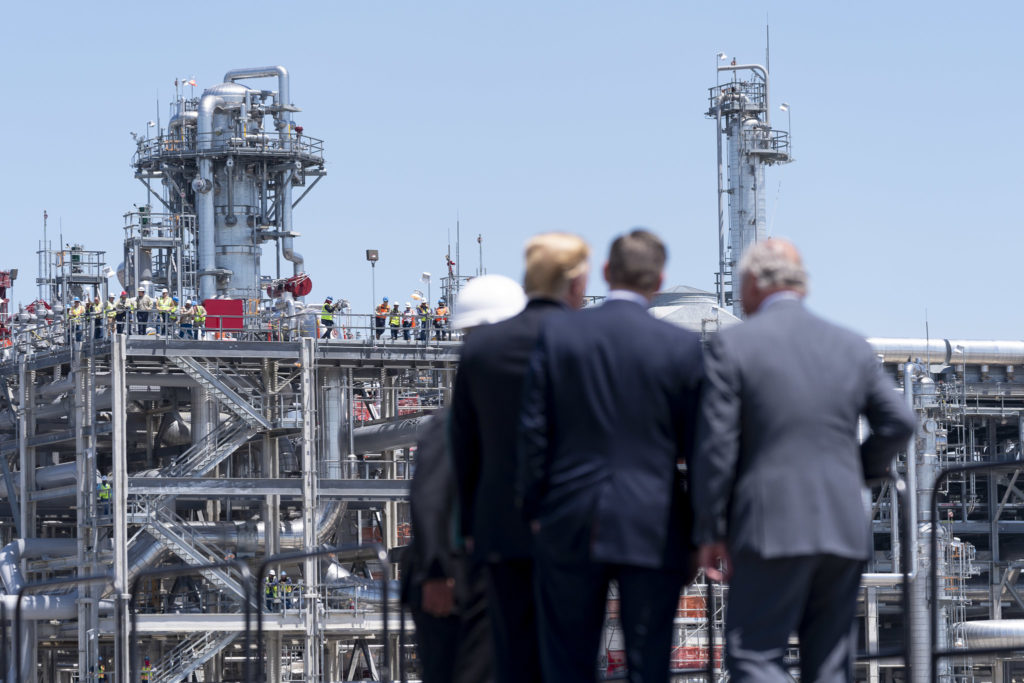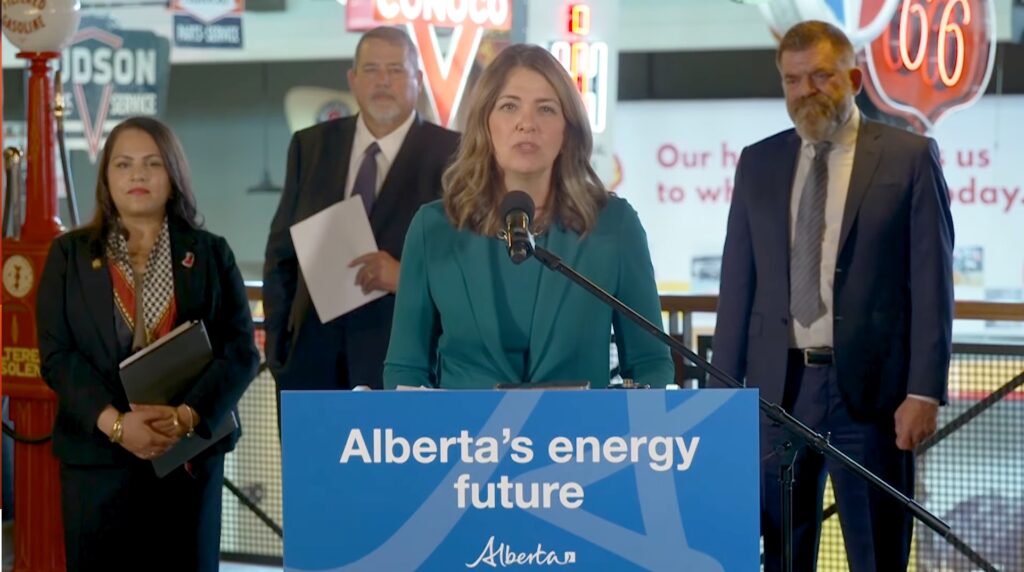“Did we aggressively fight against some of the science? Yes,” said ExxonMobil lobbyist Keith McCoy. “Did we join some of these ‘shadow groups’ to work against some of the early efforts? Yes, that’s true. But there’s nothing illegal about that.”
These are the words McCoy was caught saying on a secretly recorded video released by Unearthed, Greenpeace U.K.’s investigative journalism arm, and the British Channel 4 News this summer exposing how the oil giant and lobby groups such as the American Petroleum Institute seed doubt about climate change and undermine legislation to stop global warming.
These revelations quickly spurred calls for Congress to investigate Exxon’s and other fossil fuel companies’ efforts to obstruct climate action. On July 26, the House Committee on Oversight and Reform sent a letter to McCoy requesting his voluntary appearance before the committee. And on October 28, Congress questioned the CEOs of ExxonMobil, Chevron, BP America, Shell, and the American Petroleum Institute on their history of blocking climate policy.
For years, academics, journalists, and activists have been unearthing documents proving that the fossil fuel industry knew about the dangers of climate change since the late 1950s. That’s many, many years before McCoy was even twinkle in his daddy’s eye and decades before he came to Washington to join in Exxon’s campaign to deny science and delay action to save the planet from “catastrophic climate change” — a term Exxon used back in 1981.
These documents show how companies worked to erode public acceptance of climate science over the years — including Exxon corporate reports from the late 1970s, revealed by DeSmog in 2016, which stated “There is no doubt” that CO2 from the burning of fossil fuels was a growing “problem.”
To explain the long history of what the fossil fuel industry knew and when they knew it, Stanford University science historian Ben Franta has collected a dozen of his favorite documents.
The fossil fuel industry was first warned about climate change back in 1959 by famed physicist Edward Teller, known as “the father of the hydrogen bomb.” Throughout the ‘60s and ‘70s, oil and gas companies continued to gather evidence that burning fossil fuels was going to change the planet, perhaps even catastrophically. By the early ‘80s, the science was clear enough that oil and gas companies began to strategize on ways to control messaging about climate change and regulations. In 1989, they launched the Global Climate Coalition, a massive lobbying effort to undermine science and attack any attempt to keep fossil fuels in the ground.
Franta and I recently discussed these key documents, what they say, how they were found, and what this means for the fossil fuel industry. This conversation has been edited and condensed for clarity. Read part two of this series.
Document 1: 1959
At a Columbia University symposium, physicist Edward Teller warns oil executives about rising levels of carbon dioxide and the likelihood of global warming and sea level rise by the end of the century.
THACKER: Our first document is a speech Edward Teller gave at Columbia University warning oil executives about rising levels of carbon dioxide, global warming, and sea level rise. How did you trip over this first?
FRANTA: About four years ago, I was traveling around the country to different archives, finding what I could about the American Petroleum Institute. I went to the Hagley Museum in Delaware, and spent about a week there. On the last day, one of these few items I had left on the list …
THACKER: The fact that you spent a week of a summer vacation alone in a library tells me you lead a very exciting life.
FRANTA: Totally. You discover amazing things in archives, but even I can only take so much time alone looking through documents 10 hours a day. But I found this talk and no historian had written about it.
THACKER: Teller is this important physicist and he explains about rising levels of carbon dioxide and how this is going to change the climate and raise sea levels. But this is basic physics, right?
FRANTA: Absolutely. Teller was a nuclear physicist and major player in the Cold War. He helped develop the fusion bomb, which is immensely more powerful than even the atomic bomb. This event was a special conference that the American Petroleum Institute put on with Columbia University as the 100th anniversary of the American oil industry, because oil was first struck back in 1859.
They invite Edward Teller to give a keynote talk and he says, “We have to get off of fossil fuels.” His main message was that we’re going to run out of fossil fuels eventually, and even if we don’t run out soon, we’re going to have climate change from the greenhouse effect. And you’re right. It’s basic science.
THACKER: If you go back to the late 1800s, physicists understood that greenhouse gases are what insulate the planet. So if you add more greenhouse gases, you keep in more heat. This is not complex.
FRANTA: It’s simple, basic science. Until the 1950s, the question was whether combustion of fossil fuels was enough to actually increase the amount of CO2 in the atmosphere, because the atmosphere is big, right? So people started making measurements of CO2 in the atmosphere and they could see it was going up. And that’s what tipped off Edward Teller.
Document 2: 1965
At the American Petroleum Institute’s annual meeting, president Frank Ikard announces to industry leaders that President Lyndon Johnson’s council of scientific advisors has found that continued fossil fuel use would cause climate change by the year 2000, resulting in serious global impacts. “The substance of the report is that there is still time to save the world’s peoples from the catastrophic consequence of pollution, but time is running out,” Ikard said.
THACKER: In the mid-60s, the president of the American Petroleum Institute notifies members that President Johnson’s advisors concluded that fossil fuel use was going to cause climate change by the century’s end, with damaging results worldwide. How did you find this?
FRANTA: I flew into Denver, rented a car, and I drove up to Laramie, Wyoming. I spent a week looking through everything to do with the American Petroleum Institute. And Laramie has a great collection, tons of stuff—old annual proceedings from the API.
THACKER: All bound volumes?
FRANTA: Yeah. The stacks are these bookshelves on runners. You have to turn a giant crank to open up a slot that you can slide into and get the stuff out.
I would just pick up some volume from 1954, read that, then go through 1955, and so on. In this one volume from 1965, I found this speech from the president of the API that he gave three days after President Johnson’s report about the environment and pollution had been published, which had a section about climate change.
The president of the API was discussing this, how CO2 is accumulating and how it’s going to build up significantly by the end of the century, and could have some major impacts.
THACKER: One of the most important predictions is that burning coal, oil, and natural gas is adding so much carbon dioxide to the Earth’s atmosphere that it will cause changes in the climate by the year 2000. At one point, the president of API tells the crowd, “The pollution from internal combustion engines is so serious, is growing so fast that an alternative nonpolluting means of powering automobiles, busses, and trucks is likely to become a national necessity.”
I love how he calls greenhouse gas emissions from cars “pollution.” How long did the oil and gas pretend that CO2 isn’t pollution?
FRANTA: Absolutely. And they considered CO2 a pollutant back then.
They saw it as a global pollutant rather than a local pollutant, because it disperses through the whole atmosphere. It affects the whole world, but it is still a pollutant. This document shows that the oil industry was informed of the science of global warming. They clearly read that presidential report in detail and it proves that they were on notice.
Document 3: 1968
The American Petroleum Institute receives a private study it commissioned from Stanford Research Institute on industrial pollution, which warns of global warming and the need for remedial measures.
THACKER: This was found by an attorney at the Center for International Environmental Law going through archives at the University of Michigan. He told me that after he made it public, somebody bought up all the remaining copies to disappear it.
FRANTA: That’s crazy, right? The only full copy I have was submitted in support of the Philippines Human Rights Commission inquiry about climate change.
THACKER: He said that he finds stuff by going through footnotes of studies and tracking down those documents. A footnote trail led him to this document. What did you find interesting about this study?
FRANTA: Until this point, the warnings about climate to the oil industry were coming from external sources — Teller speaking at a meeting, the report from President Johnson. But this is a report where industry is asking, “Hey, can you look at pollution issues and tell us what you know, but privately.”
And these researchers do this and say, “Look, the science of climate change is pretty certain. We know that CO2 is accumulating. We know that CO2 is a greenhouse gas. We don’t know exactly how fast global warming will occur, but we can fully expect some foreseeable bad consequences.” And they recommend avoiding the problem.
This is the first time that we know so far where the oil industry hires its own consultants to help them understand this. There might be more documents, but …
THACKER: Documents that they haven’t bought up so that we don’t find them.
FRANTA: Exactly. And this is 1968 so the American Petroleum Institute can’t say, “Oh, we didn’t know about climate change.” We know that they knew.
Document 4: 1979
Exxon summer employee Steve Knisely writes an internal report analyzing ways to control carbon dioxide and prevent global warming. He concluded that limiting CO2 to a “relatively safe level for the environment” would require immediate action.
THACKER: Let’s jump forward a decade to the ‘70s with this internal report written by an Exxon employee. He writes that limiting CO2 to a relatively safe level for the environment will require immediate action. This is 1979 when ExxonMobil lobbyist Keith McCoy was probably in elementary school.
So when McCoy was caught on tape admitting that Exxon fought the science, it’s like, “No shit, dude. Your company knew before you were taught how to add and subtract fractions.”
FRANTA: When you put it into that context, it’s really mind blowing. This is a key document because it’s about how to avoid global warming. There were options to avoid global warming, and Exxon knew that there were options.
THACKER: It says that if you want to limit CO2, then over 80 percent of fossil fuels had to stay in the ground. I can remember a point where “stay in the ground” or “keep it in the ground” was viewed as some wall-eyed concept not to be uttered by polite company because it trespassed on the oil industry’s right to drill, drill, drill.
But Exxon knew it back in ‘79.
FRANTA: So true. The Exxon employee writing this report found that over 80 percent of fossil fuels have to stay in the ground to limit CO2 as much as feasible, because all these scenarios in this report were considered feasible. The report had more specific recommendations if we went beyond that, like never developing oil sands. And this whole document shows Exxon knew what business choices were going to cause really severe, catastrophic climate change. And Exxon went ahead and did it anyway.
THACKER: I love how the report is stamped “PROPRIETARY INFORMATION For Authorized Company Use Only.” You gotta wonder, “Well, why are you worried if other people see this?”
FRANTA: And how come we’re only seeing this in 2015? How come we had to wait 35 years?
Document 5: 1980
The American Petroleum Institute’s internal CO2 and Climate Task Force meets in New York for a presentation by Stanford scientist John Laurmann, who warned industry representatives of the need for prompt action. Business as usual would lead to:
2005: 1°C rise in temperatures that would be barely noticeable
2038: 2.5°C rise in temperatures with major economic consequences
2067: 5°C rise in temperatures with globally catastrophic effects
THACKER: It’s 1980 and the American Petroleum Institute is like, “Whoa! We need a task force on CO2 and climate change to think about this. And we need to hire someone from Stanford!”
You’re at Stanford. What did this scientist say?
FRANTA: They asked him to give a private presentation that was an overview of greenhouse gases and global warming.
THACKER: It’s funny that they wanted this scientist to talk about something that they then denied even existed. “Hey, can you come tell us about Sasquatch? He’s not real. But we’re gonna pay you to come and tell us about him anyway.”
FRANTA: Yeah, that tells you a lot right there.
This task force had representatives from all the major oil companies, and their goal was to monitor and surveil all the climate research being done in the world. They want to know what’s going on, and who the key players are. But this was all done secretly because the public didn’t know about the existence of this task force until 2015.
This scientist from Stanford gives them this very specific breakdown — that by 2005 we’re going to have this 1°Celsius rise in temperature, but you’re not going to notice it that much.
This is pretty much spot on.
He then says that if we keep going, then in 2038 it’s going to be way worse, with major economic consequences. And if we keep going further by 2068, we’re going to have globally catastrophic effects.
THACKER: In the last couple of years, there’s been all this messaging that you’re not supposed to say “catastrophic climate change” if you want to be considered a serious person sitting at the adult table.
It’s like, “I’m for a reasonable discussion on climate change. But I’m against all those extremists talking ‘catastrophic climate change.’”
FRANTA: Well, guess what? The fossil fuel industry was secretly discussing catastrophic climate change in 1980.
THACKER: Right. And they rely on models for this. Because we’ve gone through several decades of the fossil fuel industry and their lackeys beating the shit out of climate models, especially the hockey stick graph.
Models obviously work because the API was secretly using them in 1980, but they had to pivot into denying climate models later.
FRANTA: Totally. Obviously, the oil industry uses models all the time, right, for all sorts of science. Another key point is that this scientist tells API, “Here’s what’s going to happen in the future. And if we want to avoid it, we have to start acting now.”
It takes decades for a new energy source to penetrate the market and he told them in 1980 that it wasn’t too early to act.
Document 6: 1980
The American Petroleum Institute publishes “Two Energy Futures,” a policy booklet that advocates expanding coal, oil, and gas production for decades. This represents industry’s earliest known public disinformation on climate, as it made no mention of the API’s internal understanding of climate change, and falsely argued scientists were split over global warming.
THACKER: Now we have a booklet that API distributes to the public that advocates that we expand coal, oil, and gas production for decades. This is their first public disinformation campaign, right?
FRANTA: This is the earliest instance I’ve found of industry giving false information to the public. All the previous documents we discussed are private, where they privately acknowledge the problem with climate change. And yet, they publish this booklet to convince the public that there’s no problem and we should use way more fossil fuels, and ramp up production for decades.
This was partly a response to the political climate back then when people were starting to say, “You can’t be burning more coal because of global warming.”
THACKER: Unlike all the documents that were hidden, this document was public. But I’m guessing that industry now wants to hide it. Most people accept that global warming is happening and companies want to hide that they were once denying it.
It’s the way Big Tobacco denied the dangers of smoking for decades, and then around the ‘80s and pivoted into, “Well why are you suing us? Everybody and his grandma knows that smoking causes cancer.”
FRANTA: Oh yeah. There wasn’t really ever a time when the oil industry was doing the right thing about global warming. One more thing, this booklet relies on a study from MIT to back up its claims about global warming. This study was funded and basically put together by people from the fossil fuel industry, but they got an MIT business professor to sort of be the head of it, and put the mighty stamp of MIT on it.
Industry then launders its own propaganda by saying, “Oh, this is an MIT study that says we should burn more coal.”
THACKER: I tracked how this type of tactic started in the ‘50s, when tobacco invaded academia and hijacked academic research on the dangers of smoking. This tobacco program set the foundation for corporate influence at universities. No industry runs a disinformation program today without the help of university professors. I just hadn’t heard of this example with fossil fuels and MIT.
This ends part one of our two-part look at the ‘Dirty Dozen Documents of Big Oil’s Secret Climate Knowledge’ that examines the fossil fuel industry’s multi-decade journey to learn about climate change and then try to deceive the public about the science. In part two, we look at industry’s growing alarm that greenhouse gas emissions will force governments to regulate fossil fuel companies, resulting in the formation of the Global Climate Coalition, which sought to deny the science of climate change. Read part two.
This interview has been co-published by DeSmog and The DisInformation Chronicle.
Paul D. Thacker is an investigative journalist with over 15 years uncovering campaigns to distort science. He has written on scientific ethics for outlets including the New York Times, JAMA, Washington Post, The BMJ, HuffPost, NEJM, and Los Angeles Times. He now runs The DisInformation Chronicle. While serving as an investigator in the U.S. Senate, he helped to pass the Physician Payments Sunshine Act and ethics reforms at the National Institutes of Health.
Subscribe to our newsletter
Stay up to date with DeSmog news and alerts







